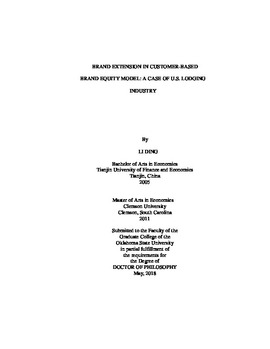| dc.contributor.advisor | Qu, Hailin | |
| dc.contributor.author | Ding, Li | |
| dc.date.accessioned | 2019-03-25T21:59:33Z | |
| dc.date.available | 2019-03-25T21:59:33Z | |
| dc.date.issued | 2018-05 | |
| dc.identifier.uri | https://hdl.handle.net/11244/317771 | |
| dc.description.abstract | The main purposes of this study were (1) to establish an integrated customer-based brand extension equity resonance model in the U.S. lodging context; and (2) to provide practical suggestions for hotel practitioners aiming to build strong brands. This study used descriptive and causal research methods to develop and examine the proposed research model. The target population comprised of leisure-purposed U.S. hotel guests who have had accommodation experiences with one of five U.S. hotel chains within the last six months. The study employed convenience sampling and participants were recruited from MTurk through an online self-administered survey. The sample size included 657 cases for data analysis. Descriptive statistics, confirmatory factor analysis, structural equation modeling, and hierarchical multiple regression were used for data analysis. A total of 15 hypotheses were proposed based on theories and prior studies. The findings supported all paths among the constructs, including brand extension's attribute-level performance, brand extension's brand personality, perceived overall quality toward brand extension, consumer emotional responses toward brand extension, consumer satisfaction toward brand extension, consumer brand loyalty toward brand extension, consumer attitudinal attachment toward parent brand, consumer sense of community toward parent brand, and perceived image fit between parent brand and brand extension. This study identified positive effects of brand associations on consumer judgment toward brand extension, positive effects of consumer judgment on consumer brand loyalty toward brand extension, positive effects of consumer brand loyalty toward brand extension on parent brand resonance, and a positive moderating effect of perceived image fit between consumer loyalty toward brand extension and parent brand resonance. The study contributed to exploring the mediating effects of consumer emotional responses toward brand extension on the relationship between brand associations and brand extensions' marketing performance. It also considered the feedback effect and identified the mechanism by which consumer brand loyalty toward hotel brand extension could affect the consumer-brand relationship of the parent brand. Finally, the study offered lodging practitioners several suggestions for developing strong brand-consumer relationships through the use of brand extension strategies. | |
| dc.format | application/pdf | |
| dc.language | en_US | |
| dc.rights | Copyright is held by the author who has granted the Oklahoma State University Library the non-exclusive right to share this material in its institutional repository. Contact Digital Library Services at lib-dls@okstate.edu or 405-744-9161 for the permission policy on the use, reproduction or distribution of this material. | |
| dc.title | Brand extension in customer-based brand equity model: A case of U.S. lodging industry | |
| dc.contributor.committeeMember | Yang, Jing | |
| dc.contributor.committeeMember | Chung, Yeasun | |
| dc.contributor.committeeMember | Brown, Tom J. | |
| osu.filename | Ding_okstate_0664D_15724.pdf | |
| osu.accesstype | Open Access | |
| dc.type.genre | Dissertation | |
| dc.type.material | Text | |
| thesis.degree.discipline | Human Sciences | |
| thesis.degree.grantor | Oklahoma State University | |
